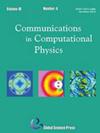双曲守恒定律的数据驱动尺度不变加权紧凑非线性方案
IF 3.1
3区 物理与天体物理
Q1 PHYSICS, MATHEMATICAL
引用次数: 0
摘要
随着各种技术的不断发展,机器学习在流体力学领域的可行性和前景越来越广阔。在本文中,我们提出了一种机器学习方法,用于提高加权紧凑非线性方案(WCNS)的分辨率和鲁棒性。我们在 WCNS 方案中采用神经网络作为加权函数,并采用数据驱动的方法来训练该神经网络。神经网络可以学习新的平滑度度量,并计算出固有的权重函数。为了简化机器学习任务并使用更少的数据进行训练,我们将先验知识整合到了学习过程中,例如伽利略不变输入层和 CNS 多项式。三角洲层的归一化(所谓的三角洲层用于计算输入特征)确保了 WCNS3-NN 方案在函数的任意标度下实现标度不变特性(Si-property),以及非连续函数的基本非振荡近似(ENO-property)。数据驱动的 WCNS 方案的 Si-property 和 ENO-property 得到了数值验证。介绍了几个一维和二维基准示例,包括强冲击和冲击-密度波相互作用,以展示所提方法的优势。本文章由计算机程序翻译,如有差异,请以英文原文为准。
A Data-Driven Scale-Invariant Weighted Compact Nonlinear Scheme for Hyperbolic Conservation Laws
With continuous developments in various techniques, machine learning is
becoming increasingly viable and promising in the field of fluid mechanics. In this
article, we present a machine learning approach for enhancing the resolution and robustness of the weighted compact nonlinear scheme (WCNS). We employ a neural
network as a weighting function in the WCNS scheme and follow a data-driven approach to train this neural network. Neural networks can learn a new smoothness
measure and calculate a weight function inherently. To facilitate the machine learning task and train with fewer data, we integrate the prior knowledge into the learning
process, such as a Galilean invariant input layer and CNS polynomials. The normalization in the Delta layer (the so-called Delta layer is used to calculate input features)
ensures that the WCNS3-NN schemes achieve a scale-invariant property (Si-property)
with an arbitrary scale of a function, and an essentially non-oscillatory approximation of a discontinuous function (ENO-property). The Si-property and ENO-property
of the data-driven WCNS schemes are validated numerically. Several one- and two-dimensional benchmark examples, including strong shocks and shock-density wave
interactions, are presented to demonstrate the advantages of the proposed method.
求助全文
通过发布文献求助,成功后即可免费获取论文全文。
去求助
来源期刊

Communications in Computational Physics
物理-物理:数学物理
CiteScore
4.70
自引率
5.40%
发文量
84
审稿时长
9 months
期刊介绍:
Communications in Computational Physics (CiCP) publishes original research and survey papers of high scientific value in computational modeling of physical problems. Results in multi-physics and multi-scale innovative computational methods and modeling in all physical sciences will be featured.
 求助内容:
求助内容: 应助结果提醒方式:
应助结果提醒方式:


